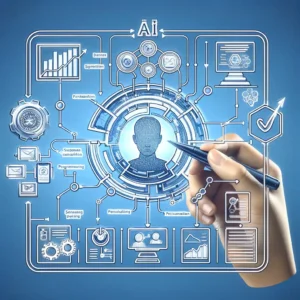Understanding the Foundation of AI in Marketing
Artificial Intelligence (AI) in marketing is no longer a futuristic concept; it’s a reality shaping the way we engage with audiences and analyze data. At its core, ai in marketing leverages machine learning, data analytics, and automated systems to provide targeted, efficient, and personalized marketing experiences. In this comprehensive guide, we’ll explore the essentials of AI marketing, its evolution, critical concepts, real-world applications, and practical strategies for 2024.
The Evolution of AI in Marketing: From Past to Present

The journey of AI in marketing is a tale of continuous evolution. From basic data collection methods to the sophisticated use of machine learning models, AI has fundamentally transformed marketing strategies. This section delves into the historical progression of AI in marketing, illustrating how it has shifted from a supplementary tool to a central component in strategic planning and execution.
Core Concepts of AI Marketing: Breaking Down the Basics
- Machine Learning & Predictive Analytics: At the heart of AI marketing lies machine learning, where algorithms learn from data to predict future consumer behaviors and trends.
- Natural Language Processing (NLP): NLP enables AI systems to understand and interact using human language, enhancing customer service and content creation.
- Data-Driven Personalization: AI harnesses consumer data to tailor marketing messages, ensuring relevance and enhancing user engagement.
Implementing AI in Your Marketing Strategy
Implementing ai in marketing requires a strategic approach:
- Identify Objectives: Determine what you want to achieve with AI, whether it’s improved customer segmentation, personalized marketing, or efficient campaign management.
- Select Suitable AI Tools: Choose AI tools and platforms that align with your objectives and integrate well with your existing systems.
- Collect and Analyze Data: Utilize AI to gather and analyze consumer data, deriving actionable insights for targeted marketing strategies.
- Test and Optimize: Continuously test AI implementations and use the insights to optimize your strategies for better results.
The Impact of AI on Customer Engagement and Retention
AI has revolutionized customer engagement by enabling hyper-personalized experiences. AI-driven chatbots, recommendation engines, and personalized marketing campaigns have shown significant improvements in customer retention rates and overall satisfaction. This section explores various AI tools and techniques that have successfully enhanced customer engagement, along with real-world examples and case studies.
Navigating Challenges and Ethical Considerations in AI Marketing
While AI offers numerous opportunities, it’s crucial to navigate its challenges responsibly:
- Data Privacy: Ensure compliance with data protection regulations and maintain transparency with customers regarding data usage.
- Bias and Fairness: Monitor AI systems for biases and implement measures to ensure fairness in marketing messages.
- Ethical Use of AI: Develop guidelines for the ethical use of AI in marketing, considering the impact on consumer perceptions and trust.
Preparing for the Future: AI Marketing in 2024 and Beyond
As we look towards 2024, AI in marketing is poised for further growth with emerging trends like voice search optimization, AI-generated content, and more immersive virtual customer experiences. Staying updated with these advancements and integrating them into your marketing strategy will be crucial for staying competitive in the evolving digital landscape.
Conclusion
AI marketing is a dynamic and ever-evolving field. By understanding its basics and keeping abreast of new developments, marketers can leverage AI to create more impactful, efficient, and personalized marketing strategies. This guide serves as a starting point for embracing AI in your marketing efforts, paving the way for innovative approaches and success in the digital world of 2024.
Related Posts
- Unlocking the Marketing Potential of AI: A Game-Changer for Success!
- Unleashing the Power of AI: The Ultimate Strategy Guide for Transforming Marketing
- Revolutionizing Marketing: How AI is Driving Innovation in the Industry
- Revolutionize Your Marketing Campaigns with AI-Powered Ideas
- Navigating the World of AI Marketing Tools: A Comprehensive Guide for 2024

